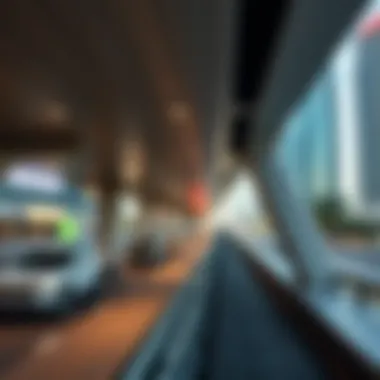Transitioning from Business Bay to International City


Intro
Dubai's urban landscape is a canvas of continuous evolution. From the bustling heart of Business Bay to the diverse tapestry that is International City, the transitions within this city reflect a broader narrative of growth and opportunity. Understanding this journey is essential for anyone looking to navigate the intricate pathways of Dubai's real estate market. The significance of this exploration lies not just in the geographical shift, but in the rich layers of infrastructure, investment prospects, and demographic shifts that define these neighborhoods.
In Business Bay, one encounters a vibrant hub, characterized by towering skyscrapers and upscale amenities. Here, the scene is lively, with luxury hotels and trendy cafes peppering the landscape. People from all walks gather, weaving a multicultural fabric that is distinctly Dubai. As we transition to International City, the atmosphere shifts. This locale is often regarded as a quieter, more affordable alternative, designed to cater to the diverse expatriate communities that call it home. Understanding these contrasting yet complementary settings helps outline the opportunities and challenges that investors may face.
This article seeks to provide a thorough examination of the nuances and developments within these areas. By dissecting current market trends, investment strategies, and the looming future of Dubai's real estate, we equip not only investors but also real estate agents and homebuyers with the insights needed to make informed decisions.
Understanding Business Bay
Business Bay is not just an area in Dubai; it is a microcosm of the city’s ambitious vision for urban development and growth. Nestled adjacent to the iconic Burj Khalifa and the Dubai Canal, this bustling district pulsates with energy and potential. Understanding the nuances of Business Bay is crucial for anyone looking to navigate the dynamics of Dubai’s real estate market. The area serves as an economic powerhouse, attracting investors, entrepreneurs, and expatriates alike, all drawn in by its unique blend of modernity, accessibility, and luxury.
Historical Context
The roots of Business Bay can be traced back to the early 2000s when the Dubai government identified the necessity for a central business district to bolster the emirate's economic competitiveness. Initially branded as a commercial hub, it has morphed into a multifaceted neighborhood encompassing residences, hotels, and leisure spaces, offering a glimpse into Dubai’s rapid evolution. The vision behind Business Bay was not just to create another district but to weave a vibrant tapestry of entrepreneurship and lifestyle.
Over the years, the area has seen monumental changes, shifting from an empty canvas into a thriving environment packed with skyscrapers, each telling a story of architectural ambition. The community has, therefore, played a pivotal role in shaping Dubai's business narrative.
Architectural Significance
Business Bay wears its architectural diversity as a badge of honor. The skyline showcases an array of architectural styles, mixing contemporary designs with nods to cultural heritage. Noteworthy buildings include the mesmerizing JW Marriott Marquis and the elegant Bay Square, which offers a unique pedestrian experience amidst the urban fabric.
Several structures have been crafted with intricate designs, symbolic of the emirate's innovative spirit. Many of these buildings are designed for mixed-use, further underscoring Dubai's commitment to creating live-work-play environments.
Economic Hub Features
As the economic engine of Dubai, Business Bay harbors a multitude of features that cater to businesses and residents alike. One significant aspect is its proximity to major transport links, making it an ideal location for both local and international companies. The presence of multinational corporations and startups alongside small businesses paints a picture of a balanced ecosystem.
Additionally, the area offers a plethora of financial services, ranging from banks to consultancy firms. It’s a system designed to support both large enterprises and individual entrepreneurs. With a variety of dining and retail options, Business Bay isn't just transactional; it promotes a lifestyle that is as much about work as it is enjoyment.
Lifestyle and Amenities
Living in Business Bay means embracing a lifestyle enriched with upscale amenities and recreational options. The district boasts luxurious high-rise apartments, each providing stunning views of the Burj Khalifa and the Dubai Fountain.
Residents enjoy easy access to parks, restaurants, and cultural venues that host events throughout the year, fostering a sense of community. Moreover, with the proximity of the Dubai Mall and the vibrant Downtown area, residents are never far from shopping, entertainment, and culinary experiences.
Navigating to International City
When thinking about the move from Business Bay to International City, several factors come into play. This section unpacks the significance of navigating this trajectory, focusing on the geographical positioning as well as the transport options available. Understanding these elements is integral for home buyers, investors, and anyone considering the dynamics of Dubai’s real estate landscape.
Geographical Overview
International City stretches on the eastern outskirts of Dubai, serving as an affordable housing alternative with a diverse array of cultural influences. Covering approximately 800 hectares, it's designed to accommodate around 60,000 residents.
Located about ten kilometers from Dubai’s downtown area, this neighborhood is strategically positioned for those who appreciate proximity to the bustling economic and cultural hubs. The layout is distinctly organized into clusters representing different countries, providing a unique atmosphere for residents.
- Impact on Living Experience: The geographical diversity creates a melting pot of cultures. It is common to hear many languages spoken in the streets, transforming daily life into an international experience. For expatriates, settling in one’s specific cultural enclave could be as comforting as a warm cup of tea.
Transport Links and Accessibility


Accessibility is a key ingredient in the recipe of any successful community, and International City is no exception. Several transport links make the area well-connected to the rest of Dubai and even beyond. Although some might consider it a bit out of the way, the connectivity is surprisingly commendable.
- Roadways and Public Transport: The Mohammed Bin Zayed Road provides easy access to the area. Plus, there are multiple bus routes that run daily, connecting residents to key points such as the Dubai Metro. This offers direct access to major areas, easing the daily commute.
- Future Transit Developments: With upcoming infrastructural enhancements planned, including expansions of metro services, International City is positioned to become even more accessible, ensuring that residents can enjoy both the tranquility of suburban life and the hustle and bustle of city living.
Planned Infrastructure Developments
As Dubai continues to push the envelope on urban development, International City is set to benefit from a series of planned infrastructure initiatives. These changes are expected to transform the area further, making it a more attractive destination for potential residents and investors.
Major upcoming projects include:
- Retail Expansion: Plans are in place to enhance the shopping and dining experiences by introducing new retail spaces and restaurants, providing residents with more lifestyle options without needing to venture far.
- Community Amenities: There’s a push for more recreational facilities, such as parks, sports complexes, and community centers. This would not only improve the quality of life for residents but also add to the investment appeal of the neighborhood.
- Smart City Initiatives: Dubai’s commitment to becoming a smart city translates into projects aimed at integrating technology into everyday life, making International City a forward-thinking choice for both living and investing.
The combination of geographical advantages, robust transport links, and forward-looking developments positions International City as a compelling city within a city.
In essence, the journey towards International City isn't just about relocation; it's about embracing a blend of cultures, convenience, and the promise of future growth. The unique characteristics of this neighborhood make it vital for buyers to consider as part of their real estate journey in Dubai.
Comparative Analysis of Neighborhoods
The comparative analysis of neighborhoods serves a critical role in understanding the dynamic landscape of Dubai. As investors, buyers, and agents keenly observe shifts, the variances between areas not only shape investment strategies but also guide lifestyle decisions. Each neighborhood carries its own unique flair, characterized by property prices, community dynamics, and growth potential. This analysis unfolds as a tapestry woven from the threads of economic viability, cultural authenticity, and residential appeal, providing a roadmap for making informed choices in the bustling market.
Property Valuation Trends
Examining property valuation trends between Business Bay and International City offers vital insights into market shifts. Business Bay, known for its modern skyscrapers and sprawling office spaces, tends to have a higher property valuation. Prices here soar, reflecting the area’s appeal as a business hub and cultural melting pot. On the other hand, International City, with its diverse architecture and community-centric vibe, presents a contrasting picture.
- Current Trends: Recent studies have shown a slow but steady incline in property values in International City, as it captures the attention of families and expatriates, becoming a more desirable location.
- Valuation Comparison: Where Business Bay might fetch higher per-square-meter rates, the increasing interest in International City is pushing its valuations closer to more established locales.
This disparity emphasizes the importance of comprehending local nuances when contemplating investment paths. The valuation landscape is not static; it fluctuates, driven by factors such as infrastructure improvements and changing demographic dynamics.
Investment Opportunities
Investment opportunities in Business Bay and International City diverge significantly, beckoning different profiles of investors.
- Business Bay Advantages:
- International City Prospects:
- Commercial Focus: Primarily a commercial hub, investment here often translates to higher rental yields, especially due to demand from corporate tenants.
- Star-Studded Developments: Projects like the Dubai Canal and high-end residential towers continue to draw attention, ensuring a steady influx of investors.
- Affordability: With lower entry prices, International City attracts investors seeking cash flow, leveraging the growing demand for affordable housing.
- Diverse Community: The area's multicultural makeup boosts demand for rental properties, creating a stable income stream for landlords.
Understanding these investment channels allows buyers and investors to align their strategies with their financial goals, whether they seek high-risk, high-reward avenues or steady, low-maintenance options.
Demographic Insights
Demographic insights play a pivotal role in shaping neighborhood identities, impacting everything from property demand to community engagement. It's essential to observe how demographics differ across Business Bay and International City.
- Business Bay: Predominantly populated by young professionals and expats working in corporate sectors, the area is bustling with dynamic individuals seeking modern living solutions. The average age skews younger, reflecting the professional clientele drawn to high-end apartments and condos.
- International City: In contrast, the demographics here are more diverse and family-oriented. Many residents are expatriates seeking affordable accommodation while enjoying community amenities. The mix of cultures fosters a unique atmosphere, enhancing the appeal of International City as home for families and individuals alike.
Analyzing these demographic trends is crucial for stakeholders, as they influence consumer behavior, design preferences, and ultimately, the lifecycle of real estate investments.
Considering the demographics and property valuation can allow investors to anticipate shifts in demand, making informed decisions that align with their objectives.
Market Dynamics


Understanding the market dynamics in Dubai is crucial for anyone looking to navigate the real estate landscape. The ebb and flow of property values, the shifting economic tides, and the influx of global investors all intertwine to create a unique tapestry. This section unpacks these dynamics and how they play a pivotal role in shaping the future for both Business Bay and International City.
Current Market Trends
The current state of the Dubai real estate market is characterized by a blend of resilience and adaptability. Recent reports indicate that property prices in Business Bay have seen a rebound post-pandemic, as businesses aim to establish a foothold in this bustling district. Investors are particularly keen on high-rise apartments and luxury offices here, buoyed by the ongoing infrastructural development and commercial appeal. Meanwhile, International City, with its affordability and diverse community, has become a hotspot for expatriates and first-time homebuyers seeking value for money.
Several key trends emerge:
- Increased Demand for Rental Properties: Many expats prefer renting rather than buying due to the flexibility it offers.
- Rise of Co-working Spaces: With the shift towards remote and hybrid work models, there’s a growing interest in flexible office spaces.
- Sustainable Developments: There are more eco-friendly buildings sprouting up, aligning with global sustainability trends.
“Maximizing property potential requires staying ahead of trends. Knowledge of the market can make or break an investment.”
Future Projections
Looking ahead, analysts predict a steady growth trajectory for Dubai's real estate market. With the World Expo laying foundations for a surge in tourism, the demand for both residential and commercial properties is expected to increase significantly. Furthermore, initiatives like the Dubai 2040 Urban Master Plan are set to enhance urban infrastructure and accessibility, making previously less desirable areas, including International City, more attractive for investment.
Investors are urged to keep an eye on:
- Emerging Micro-markets: Areas that are currently undervalued may offer substantial returns in the coming years.
- Smart City Concepts: Integration of technology in urban planning can influence property values.
- Regulatory Changes: New laws regarding property ownership for foreigners may open doors to more investments.
Influence of Global Events
The ripple effects of global events have a tangible impact on Dubai's real estate. Various factors contribute to the fluctuating market dynamics.
- Economic Shifts: A downturn in major economies can lead to reduced foreign investments, affecting property demand and prices in Dubai.
- Geopolitical Stability: The UAE's role as a safe haven influences property desirability, especially during times of unrest in neighboring regions.
- Health Crises: The pandemic has shown the vulnerability of markets to unforeseen health challenges, resulting in shifts in buyer priorities, such as the search for more spacious living arrangements post-lockdown.
Understanding these variables helps stakeholders navigate the complexities of the market. The insights gained from such analyses are invaluable for informed decision-making on property investments.
For further exploration of the dynamics that drive Dubai's real estate market, check out these resources:
Lifestyle Considerations
Lifestyle considerations are pivotal when analyzing the dynamic shifts between Business Bay and International City. These neighborhoods are not merely points on a map but embody distinct lifestyles and values. Understanding these differences can influence investment choices, particularly for those seeking homes or rental properties in Dubai.
Cultural Landscape
The cultural fabric of an area plays a significant role in determining its appeal to various demographics. Business Bay, with its contemporary high-rises and diverse community, offers a bustling atmosphere infused with a cosmopolitan vibe. Residents often engage in art exhibitions, workshops, and cultural festivals that celebrate both local heritage and global diversity.
In contrast, International City showcases a more tranquil, community-oriented lifestyle. This area reflects a mosaic of cultures through its unique architectural designs inspired by different world regions. For example, characters from the Chinese and Italian engineering styles create a rich visual narrative. People here often partake in multi-cultural activities, fostering a sense of neighborhood and belonging. No matter which place you find yourself in, the cultural experiences available can shape daily life and influence collective community pride.
Community Engagement
A solid community base can make or break an area in terms of livability. Business Bay has earnestly worked towards creating a thriving community through its numerous corporate events, social gatherings, and networking sessions. This is where professionals, expatriates, and locals mingle, creating a rich networking environment. Additionally, pop-up shops and artisanal markets are common, which strengthens local ties while supporting small businesses.
However, International City stands out with its emphasis on inclusivity and a grassroots approach. Various community groups and clubs encourage participation among residents, emphasizing both social interaction and community development. Events like neighborhood clean-up drives or cultural fairs are just the tip of the iceberg.
“Engaging with the community can be fundamental for those considering living in these areas. A sense of connection often leads to greater satisfaction and security.”
Educational Institutions


Education is a cornerstone for families when selecting a place to live. In Business Bay, the landscape consists of several prominent international schools that cater to expatriate families. Schools like the International School of Arts and Sciences or the British International School elevate the educational standards, providing numerous extracurricular activities that broaden students' horizons.
On the flip side, International City also has its share of educational institutions, but they lean towards offering more affordable options. While the quality may vary, many families find value in schools that focus on the curriculum of their countries of origin, such as schools that emphasize Arabic or other languages. The accessibility of community colleges and training centers is another facet that attracts residents looking to enhance skills or pursue higher education.
In summary, the lifestyle considerations surrounding Business Bay and International City extend beyond mere statistics and brick-and-mortar. These facets of culture, community engagement, and educational opportunities are imprinted deeply into the urban lifestyle of each area. Awareness of these factors can significantly inform one’s choices regarding property investments in Dubai.
Regulatory Environment
The regulatory environment in Dubai plays a crucial role in shaping its real estate landscape, impacting investors and potential homeowners alike. An understanding of the laws that govern property transactions, investment opportunities, and property management structures is essential for informed decision-making. This section outlines the key legislative frameworks and considerations that prospective investors must navigate when transitioning from Business Bay to International City.
Real Estate Laws in Dubai
Dubai's real estate laws are designed to create a transparent ecosystem, ensuring that both local and foreign investors can participate in its flourishing property market. The Real Estate Regulatory Agency (RERA) oversees the enforcement of these laws, providing guidelines that bolster investor confidence.
Key components of these laws include:
- Freehold Ownership: Foreign investors are allowed to purchase property in designated areas, like International City, under a freehold agreement. This grants them a long-term ownership stake equivalent to that of a local citizen.
- Registration Requirements: Any property transaction must go through a registration process with the Dubai Land Department (DLD), ensuring that the ownership records are accurate and legally binding.
- Building and Safety Codes: Developers are obligated to adhere to strict building codes, focusing on safety and sustainability. This means that investments in Dubai are typically secure and of high quality.
These laws are designed to protect the rights of property owners while encouraging ethical business practices and reducing the risk of property fraud. An investor venturing from Business Bay to International City should familiarize themselves with these regulations to ensure compliance and the safety of their investments.
Investment Regulations for Foreigners
Foreign investment in Dubai has seen a significant rise, thanks to the favorable regulations set forth by the government. Dubai's legal framework is welcoming, creating opportunities for expatriates to invest in real estate without undue restrictions. Some key aspects include:
- Property Ownership: Foreigners can own residential real estate in various freehold areas, making investment accessible.
- Visa Privileges: Investors who purchase property valued over a certain threshold can qualify for a long-term residency visa, which allows them to reside in the UAE.
- Tax Benefits: There are no property taxes in Dubai, making it more attractive for investors who are used to higher taxes in their home countries. This setup can lead to better returns on investment over time.
Navigating these regulations is vital for anyone aiming to invest in Dubai's real estate market. Misunderstanding these rules can lead to legal complications or financial loss.
Property Management Considerations
Property management is a critical aspect for investors looking to maximize returns on their investments in Dubai's real estate market. Understanding the property management landscape is especially important for those transitioning from Business Bay, known for its luxury amenities, to International City, which caters to diverse demographics.
Considerations include:
- Professional Property Management: Enlisting a professional property management service can alleviate day-to-day issues and attract tenants quickly. Many agencies in Dubai specialize in both residential and commercial properties, ensuring a hassle-free experience.
- Market Trends: Understanding tenant preferences and market demand is key in both areas. For instance, the demand in International City may differ from that in Business Bay, primarily due to differing demographics and lifestyles.
- Maintenance and Compliance: Investors must adhere to property maintenance standards as per local regulations to avoid penalties. Conducting regular inspections and employing repair services can safeguard investment value.
Investors must be proactive in understanding their obligations under local laws. By doing so, they engage more effectively with their property and realize their investment's full potential.
To ensure a prosperous investment journey in Dubai's dynamic market, a thorough grasp of the regulatory environment is essential.
For more information regarding real estate laws and regulations in Dubai, one can visit the Dubai Land Department's website at dubailand.gov.ae.
Finale
The conclusion serves as a pivotal segmentation of this exploration into Dubai’s dynamic urban landscape, particularly as it encapsulates the journey from Business Bay to International City. With the real estate market experiencing vibrant transformations, understanding the nuances that define these neighborhoods is paramount. This section aims to distill the wealth of insights gathered in preceding sections while illustrating the interconnectedness of features, opportunities, and the driving forces behind Dubai’s ever-changing skyline.
Summary of Key Insights
As we reflect on our exploration, several key insights emerge:
- Contrasting Neighborhoods: Business Bay, known for its skyscraper-laden skyline and bustling commercial enterprise, starkly contrasts with the more residential and culturally diverse atmosphere of International City. Each area presents unique benefits; where Business Bay attracts investors drawn by high rental yields and luxury amenities, International City offers affordability with a multicultural flavor.
- Real Estate Trends: The analysis of property valuation trends reveals a dynamic market responding to both local and global influences. Business Bay maintains its position as a prime investment target, whilst International City’s appeal is on the rise, bolstered by infrastructure developments and an influx of residents seeking cost-effective living solutions.
- Demographic Shifts: The demographic insights underline a trend towards diversification. Expats from various backgrounds find their place within the community fabric of International City, highlighting a shift in housing preferences, which can shape future investment strategies.
- Market Dynamics: Current market trends indicate resilience despite fluctuations observed globally. Future projections hint at continued growth, driven by ongoing infrastructural developments and population inflow, which are set to bolster property demand across both neighborhoods.
Future of Real Estate in Dubai
Looking ahead, the future of real estate in Dubai is shaped by several factors that stakeholders must consider:
- Sustainable Development: A significant focus on sustainable urban planning is beginning to steer developments, with initiatives that aim to balance ecological considerations alongside economic growth. Property investors who prioritize sustainability may find opportunities in emerging projects embracing green technology and landscaping.
- Increasing Connectivity: Improved transport linkages, particularly the introduction of new metro lines and road expansions, will likely enhance access between Business Bay and International City. This integration may lead to a broader appeal, drawing in more residents and investors.
- Technological Integration: The usage of technology in real estate operations—such as virtual tours, blockchain for transactions, and data analytics—provides a competitive edge in marketing properties to potential buyers and renters.
- Evolving Urban Identity: As developers and the government continue to reimagine urban spaces, initiatives fostering community engagement remain key. The vision for future developments in Dubai aims not only to cater to economic growth but also to enhance the lifestyle experiences for residents, which is paramount in attracting long-term investments.











